Sexual Abuse Survivors To Protest Outside Southern Baptist National Meeting
Abuse survivors and their advocates plan to rally outside a national meeting of the Southern Baptist Convention in Birmingham, Alabama, as America’s largest Protestant denomination wrestles this week with how to address clerical sexual abuse and cover-ups of the abuse within its ranks.
Current and former Southern Baptists, as well as survivors and advocates from other denominations, will be gathering at the “For Such a Time as This” rally just outside the Birmingham-Jefferson Convention Center on Tuesday evening. The protesters are demanding concrete change ― including the creation of a clergy sex offender database for the SBC’s network of 47,000 churches and mandatory sex-abuse prevention training for all SBC pastors, staff and volunteers. They are also asking that the denomination, which approves only of male pastors, make a commitment to respect women.
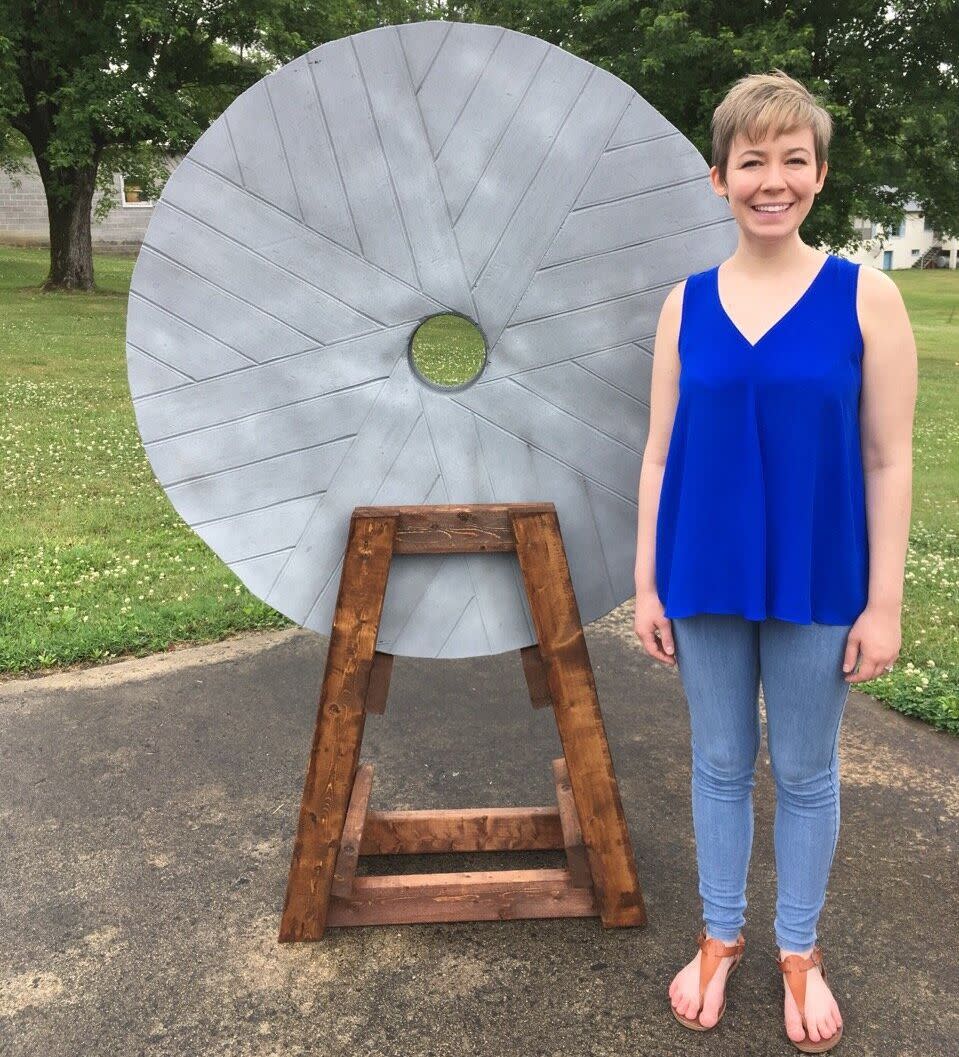
The group is bringing a large foam-board “millstone” to the rally, a reference to Jesus’ warnings in Scripture that those who harm children would be better off having a “large millstone hung around their neck” and drowning in the sea.
The harsh imagery is meant to remind Southern Baptists of how critical the issue of sexual abuse is, according to Rev. Ashley Easter, the rally’s spokesperson who was ordained through the Progressive Christian Alliance.
“Jesus uses strong words for those who harm children, and we believe the SBC needs a reminder of Jesus’ strong words,” Easter told HuffPost.
The rally is set to take place as thousands of Southern Baptist delegates from around the country gather inside the Birmingham convention center for the denomination’s annual meeting. For many delegates and onlookers, the priority on this year’s agenda is voting on key reforms aimed at holding member churches accountable for mishandling abuse allegations.
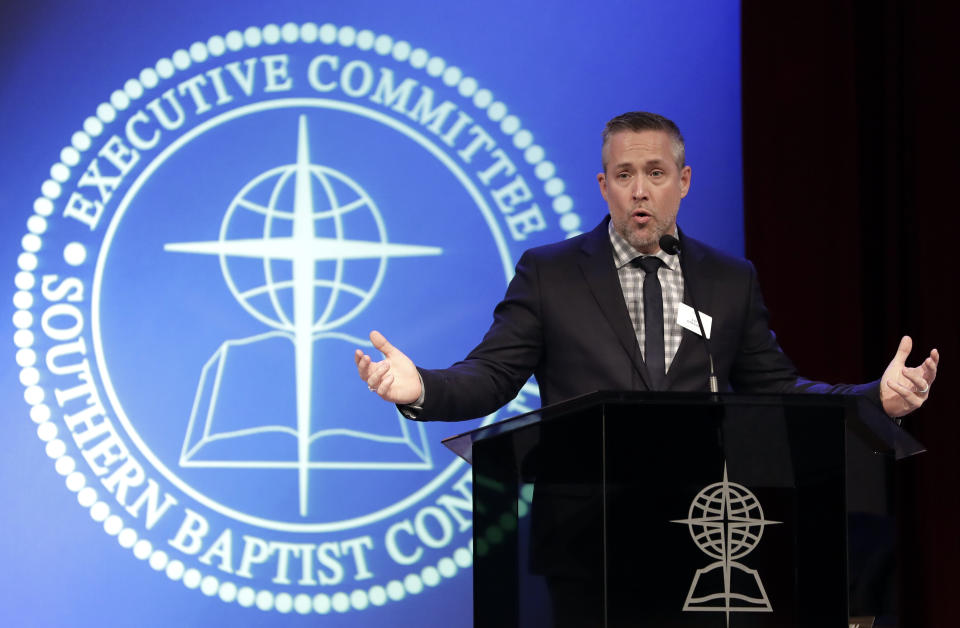
For over a year, the 14.8 million-member Southern Baptist Convention has been reckoning with the Me Too movement, which has toppled prominent leaders in the denomination and encouraged a groundswell of evangelical women to speak up and demand change. Last year, delegates to the annual meeting passed resolutions denouncing all forms of abuse, affirming women’s dignity and calling for “sexual purity” among pastors.
Calls for more action increased this year after an investigation by the San Antonio Express-News and Houston Chronicle revealed that about 380 Southern Baptist pastors, Sunday school teachers, deacons and church volunteers have been credibly accused of sexual misconduct since 1998. The investigation suggested that at least 35 SBC pastors, employees or volunteers who exhibited predatory behavior went on to find jobs at other churches.
J.D. Greear, a North Carolina pastor who was elected president of the SBC last year, formed a sexual abuse advisory group to study the issue of sexual abuse. On Saturday, the group released a lengthy report with first-person accounts from survivors, detailed recommendations on how to prevent abuse and handle abuse allegations, and links to a sex abuse training curriculum for pastors and lay leaders.
Greear told The Associated Press that he was “thankful” to the Houston Chronicle and San Antonio Express-News for shining a light on the problem.
“Only when sin is exposed to the light of truth, true repentance, healing, and change can begin,” he said.
In the past, survivors and advocates’ demands for change have been thwarted by the SBC’s doctrine of local autonomy. The SBC views itself as a network of Baptist congregations, each of which is independent and self-governing. This doctrine of autonomy has been used to argue against the creation of a denomination-wide sex offender database, for example.
At the same time, the SBC’s congregations do take some actions together ― such as funding joint missionary work and kicking out churches for affirming LGBTQ relationships.
This week, delegates are considering an option to “disfellowship” or distance the denomination from churches that mishandle sexual abuse allegations. They may also consider options for creating a sex offender database.
Easter said she believes the SBC is primarily concerned with preserving its image at the moment.
“They are trying to save face, push out statements, and suggestions for constitutional changes that will take years to approve and implement... if anything happens at all,” Easter told HuffPost in an email. “But children and vulnerable adults are being harmed NOW.”
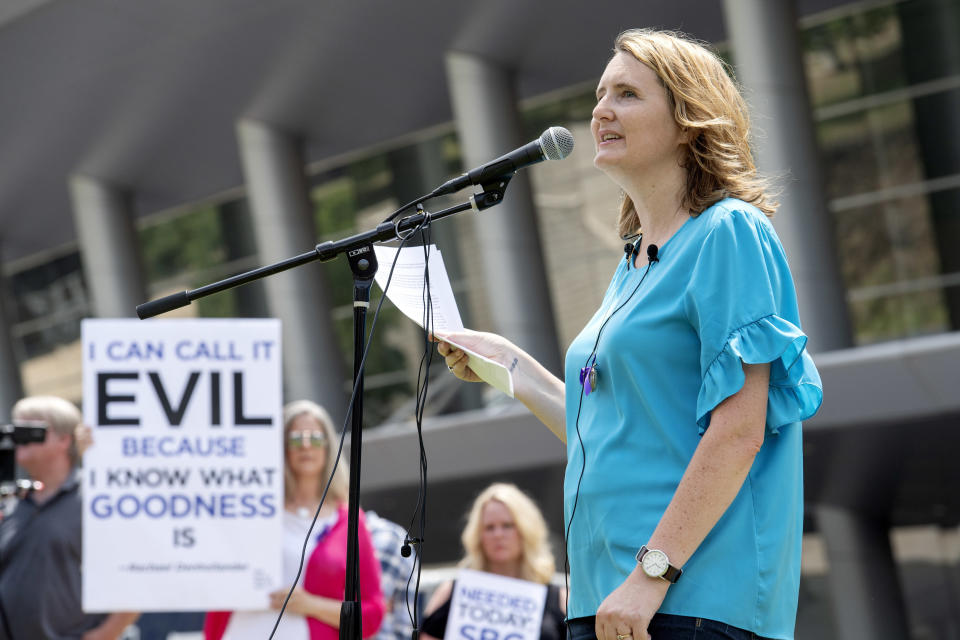
This is the second time the “For Such a Time as This” rally will be held outside the SBC’s annual meeting. The title of the rally is based on a Bible verse about Queen Esther, who risked her life to speak up about the persecution of the Jewish people.
The rally will feature speeches from survivors of sexual abuse in Southern Baptist circles, including Jules Woodson, whose decision to go public with her story eventually led to the resignation of the person she says abused her, a Southern Baptist pastor in Tennessee.
Dwight McKissic, a Southern Baptist pastor in Texas, is also scheduled to speak at the rally. He told HuffPost that he supported the rally’s goals.
“The message I hope to send out is first, WE CARE about the victims and survivors,” McKissic wrote in an email. “The SBC needs to do all that’s within their power to repair, restore, and make whole all of the survivors of abuse. The SBC needs to track predators in order to protect others from becoming victims of abuse.”
Cheryl Summers is an abuse survivor, a former Southern Baptist and the founder of the “For Such A Time As This” rally. In a recent blog, Summers pointed out that after a 2007 ABC News investigation into “predator preachers,” the SBC passed a unanimous resolution condemning sexual abuse. The denomination published a study on sexual abuse in 2008.
Summers said the time for “sweeping statements” is long gone ― and that she and other advocates hope to see real, concrete change emerge from this year’s meeting.
“A unanimous resolution condemning abuse is not action. Blog posts and press releases about abuse is not action ... Words matter. Actions matter more,” Summers wrote. “In 2019, we must remember that we’ve been here before. The Southern Baptist Convention must stop talking about abuse and must do better.”
This article has been updated with comment from Dwight McKissic.
Love HuffPost? Become a founding member of HuffPost Plus today.
Also on HuffPost
Rev. Jennifer Bailey
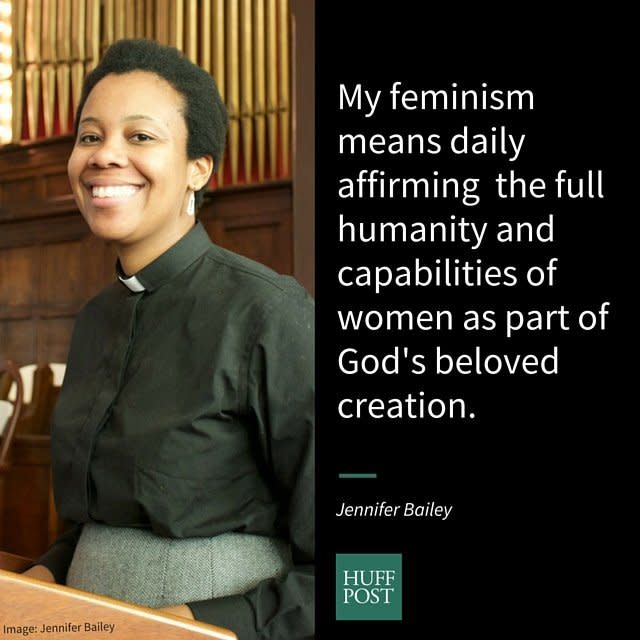
"As a Christian leader, my feminism means daily affirming the full humanity and capabilities of women as part of God's beloved creation and their sacred work in the world. It also means honoring the sacrifices, courage and labor of the many female saints of God that it made it possible for me to wear my clerical robe and preach the gospel of Jesus. Historic figures like Jarena Lee, Harriet Tubman, Sojourner Truth and Bishop Vashti Murphy McKenzie paved the way for me as did the unsung (s)heroes and everyday church mothers whose work has kept the church alive and flourishing since its inception. We still have a long way to go to completely shatter the stained glass ceiling but the ancestors have shown is it is possible by holding to God's unchanging hand. Blessed be her Holy Name."
Sarah Bessey
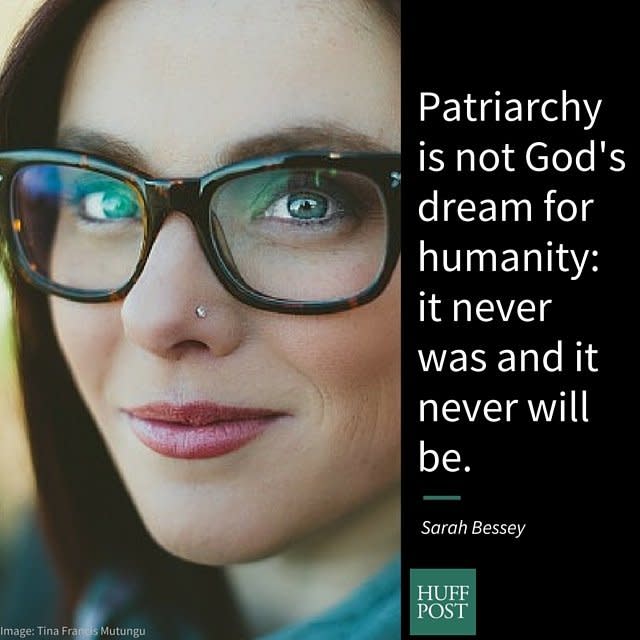
"It was following Jesus that made a feminist out of me! That discipleship lead me to caring about everything from maternal health in Haiti to sexism in the Church as issues of justice close to God's heart. Patriarchy is not God's dream for humanity: It never was and it never will be. I remain hopeful, too - more and more people are waking up to what wholeness and peace-making can look like for both men and women in the Kingdom of God which changes things on both a small personal scale but also helps to move the needle forward when it comes to systemic injustice, too."
Vicky Beeching
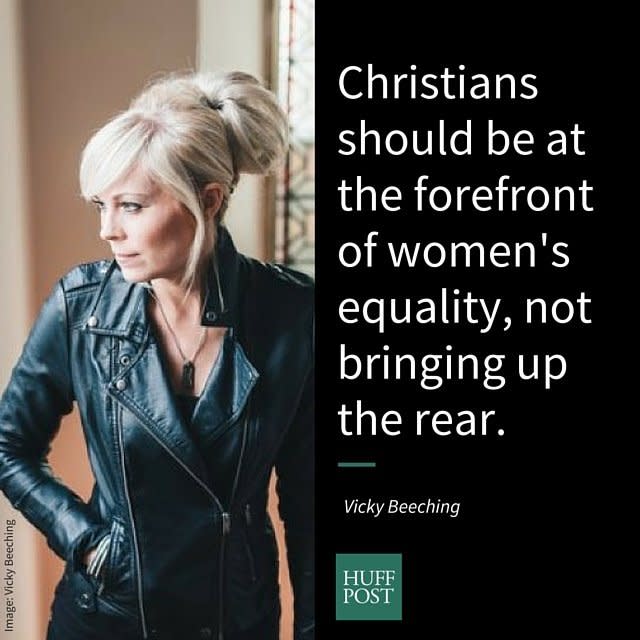
"To me, feminism means championing the rights and equality of women. Jesus treated women in ways that were truly radical for his era, so I've argued for years that Christ should be considered a feminist. The church has seemed afraid of the feminist movement, unsettled by it somehow; branding it as harsh and shrill. That seems bizarre as Christians should be at the forefront of women's equality, not bringing up the rear! Many denominations still don't let women preach, become Elders, or get ordained, so there's much work to be done. 'Christian feminism' is not an oxymoron; it's a deeply compatible, healthy response to the injustices that still exist within the faith community."
Gail Song Bantum
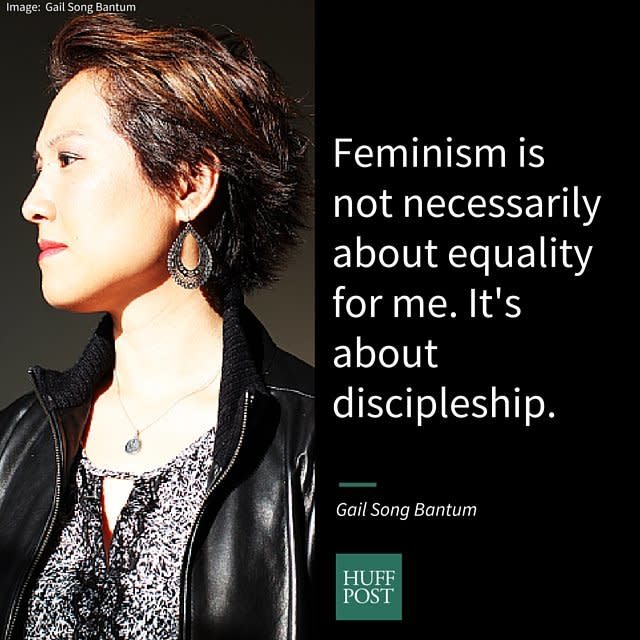
"Feminism cannot merely be an idea but a life embodied. For those of us women who have fought to live out our call in spaces of leadership within the church, we embody feminism daily whether we realize it or not. Any embrace of feminism within the church must be rooted in our deep conviction that we are all created to be free -- that it was for freedom that Christ set us free (Galatians 5:1). It is a desire for this freedom to emerge from the truth that both women and men are created fully and wholly as image bearers of God. In that sense, feminism is not necessarily about equality for me. It's about discipleship - about honoring the creativity of God in our midst, about enabling others to flourish, about fighting for another's freedom, and about submitting to the truth that we have all been gifted this breath each waking moment of the day."
Rev. Dr. Paula Stone Williams
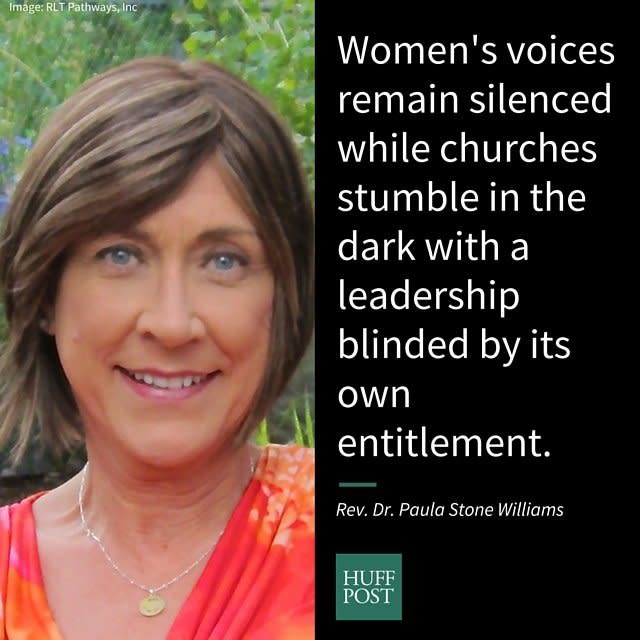
"I have preached in three of the twelve largest churches in America. Today I would not be allowed in the pulpit of a single one. Not only would I be barred because I am transgender, I would be barred because I am a woman. The irony is the things I know now make me twice the person I was before. But women's voices remain silenced while churches stumble in the dark with a leadership blinded by its own entitlement. It has made me into something I never expected I'd be -- a feminist."
Edyka Chilomé

"As a woman of color I don't identify as a feminist although I walk in solidarity with my feminist sisters and am working toward similar goals of transformative justice. I grew up in a christian context that inherited liberation theology born from third world liberation struggles and the continuous survival of indigenous mestizo peoples in the global south. My Christianity looked like rallies at the capital Sunday morning led by indigenous mestiza women who made very clear for me that God, in whatever form, is calling us to walk with the earth’s people and honor life first. This means that the world is my parish, and at the end of the day, compassion and accountability go hand and hand."
Mica McGriggs
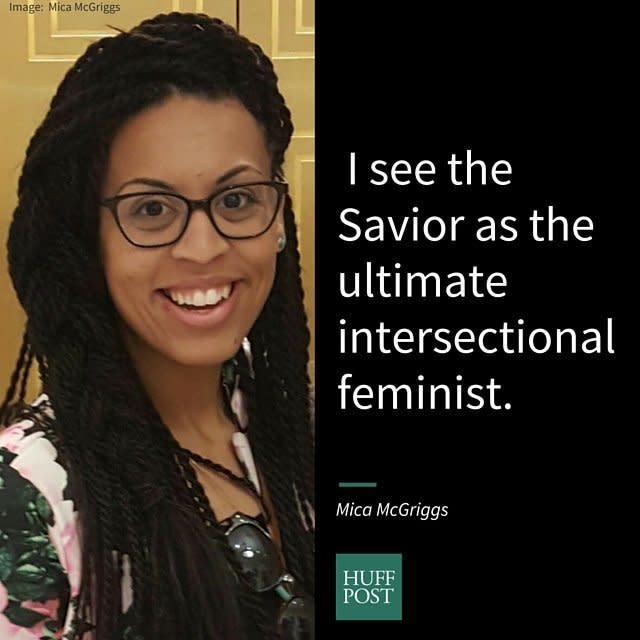
"Feminism for me as a Christian means I am working toward being more like Christ; I see the Savior as the ultimate intersectional feminist. He was always concerned and working for 'the least of these' he looked to the margins and created spaces that were inclusive to all. That is what intersectional feminism aims to do. The church would be a safer and more loving environment for all God's children if they were to embrace liberation theology and the practice of intersectional feminism."
Rev. Christine Lee
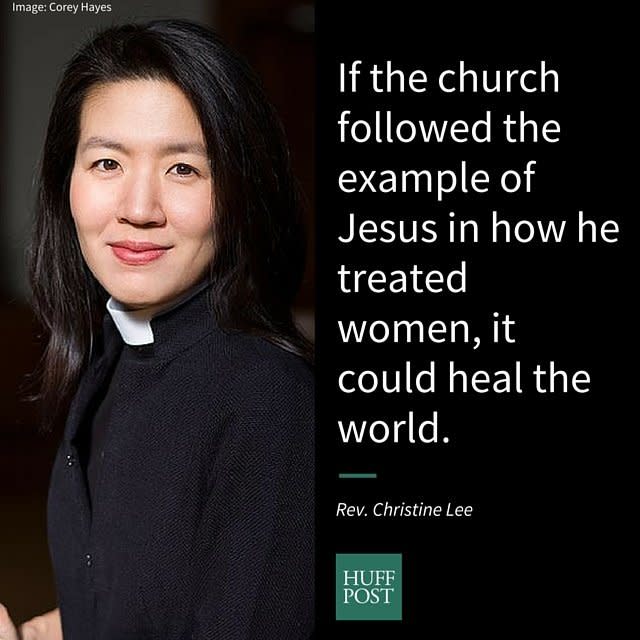
"As a Christian, to me feminism is about seeing and valuing women as Jesus did. I'm always moved by the stories of Jesus' interactions with women in the gospels. In a time and culture where women were often invisible, he saw them and treated them as ones who were honored by God and deeply loved. If the church followed the example of Jesus in how he treated women, it could heal the world. Just like the human body, the whole flourishes when every part is made stronger."
Nicole M. Garcia
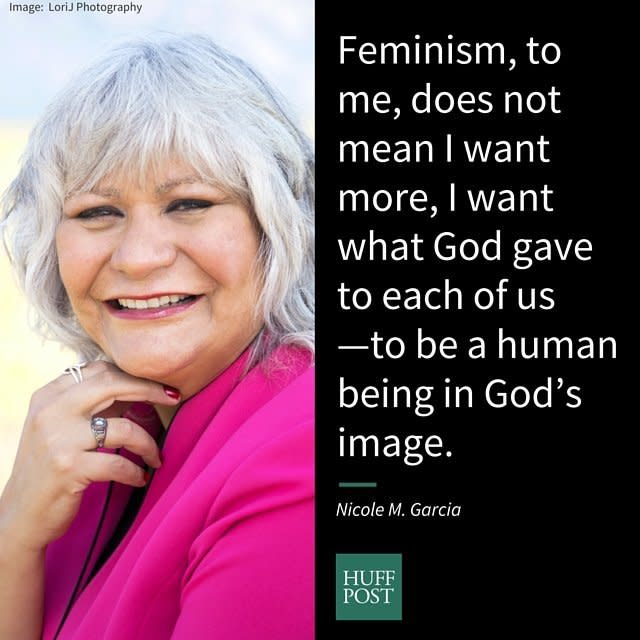
"Genesis 1: 27 is very clear: God made humankind in God’s image. Feminism, to me, does not mean I want more, I want what God gave to each of us -- to be a human being in God’s image. The church has subjugated women far too long and it is time to emphasize the love and compassion Jesus taught us in the Gospel."
Bishop Minerva G. Carcaño
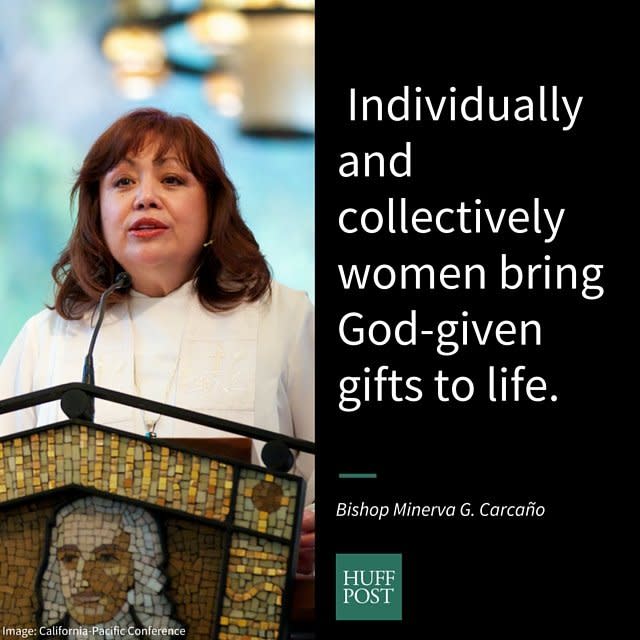
"As a Christian, I view feminism as a commitment to women having the opportunity to fully be who God created us to be. Creation itself allows us to catch a glimpse of God’s amazing creativity with all its beauty, potential and interrelationship. Individually and collectively women bring God-given gifts to life. The church has a responsibility to remind the world of the sacredness of all life including that of women. When women suffer because of discrimination due to their gender, everyone suffers through the loss of the gifts women bring to the world."
Monica A. Coleman

"For me, feminism in religion is about voice and power. It's about what I notice and what kinds of questions I ask: Where are the women in the story? Who has voice? Who doesn't? What might she have said? Who is in leadership in churches? Whose voices and perspectives have the loudest voice and influence? I try to answer these questions when I preach and teach. I want them to feel natural to my daughter's faith."
Rev. Winnie Varghese
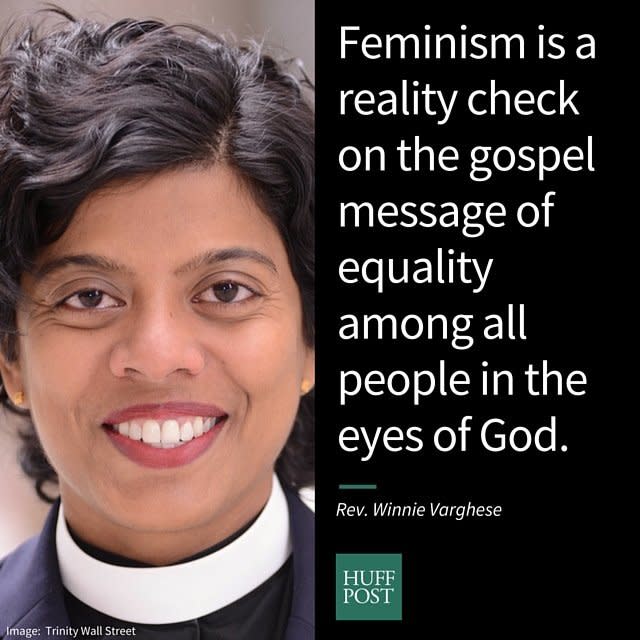
"As a Christian, feminism is a reality check on the gospel message of equality among all people in the eyes of God. If we believe we are equal in the eyes of God, we have to work to make that equality a reality in the world we live in. This has implications both for how girls and women understand their full humanity and dignity and how people of all genders understand the worth and dignity of women, which the church has historically profoundly influenced negatively."
Kate Kelly
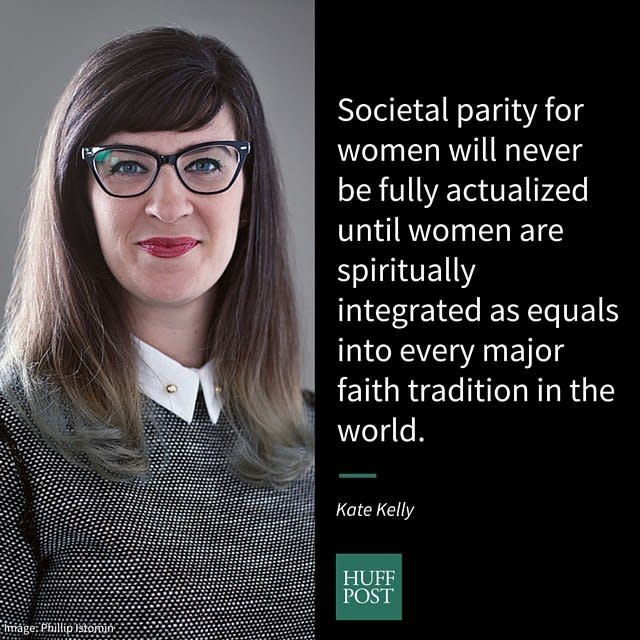
"In my home state of Utah, policy is heavily influenced by the Church of Jesus Christ of Latter-day Saints, which is an extremely patriarchal religion. Any Church that excludes women from leadership roles is clearly missing out on 50 percent of the potential, talents and wisdom of its adherents. But, religious gender discrimination also leaks out of the bounds of the institution and negatively impacts society at large. Utah has one of the largest income gaps between men and women, as well as one of the lowest female college graduation rates. The influence of the religious teachings that put women below men affect not only Mormon women, but all people that live in Utah… Societal parity for women will never be fully actualized until women are spiritually integrated as equals into every major faith tradition in the world."
Emilie M. Townes
![<i>Townes, Dean of Vanderbilt University's Divinity School, preferred to use the word “<a href="http://noteasybeingred.tumblr.com/post/206038114/alice-walkers-definition-of-a-womanist-from-in" target="_blank">womanist</a>,” a phrase coined by poet and activist Alice Walker to embrace the experiences of black feminists. Townes described the term this way: “Womanism is when historic and current insights of Black women are used to eradicate inequalities for all people with a particular focus on class, gender, race, sex and sexuality as social and theological tools to unseat evil.”</i><br /><br />"As a Christian, womanism underscores the power of the gospel working in our lives to set us all free from stereotypes based on gender, sexuality, race, class, physical ability, and all of the ways in which we are humans in God’s creation. Womanism is a spirituality of life that calls me to remember that my life is a gift from God and I should use this gift to work for peace and justice by sharing the good news and to work with others to craft a space and place for folks to thrive. This space and place, to my mind, is the church. It becomes the place that is genuine[ly] involved in being partners with God in bringing in the new heaven and new earth and an embodiment of love, hope, peace, and justice in a world that can use a good dose of each these days."](https://s.yimg.com/ny/api/res/1.2/OQaRo1ArtxbPM5rV6D0jrQ--/YXBwaWQ9aGlnaGxhbmRlcjt3PTk2MA--/https://img.huffingtonpost.com/asset/56faa4391e00009500711902.jpg)
"As a Christian, womanism underscores the power of the gospel working in our lives to set us all free from stereotypes based on gender, sexuality, race, class, physical ability, and all of the ways in which we are humans in God’s creation. Womanism is a spirituality of life that calls me to remember that my life is a gift from God and I should use this gift to work for peace and justice by sharing the good news and to work with others to craft a space and place for folks to thrive. This space and place, to my mind, is the church. It becomes the place that is genuine[ly] involved in being partners with God in bringing in the new heaven and new earth and an embodiment of love, hope, peace, and justice in a world that can use a good dose of each these days."
Gina Messina-Dysert
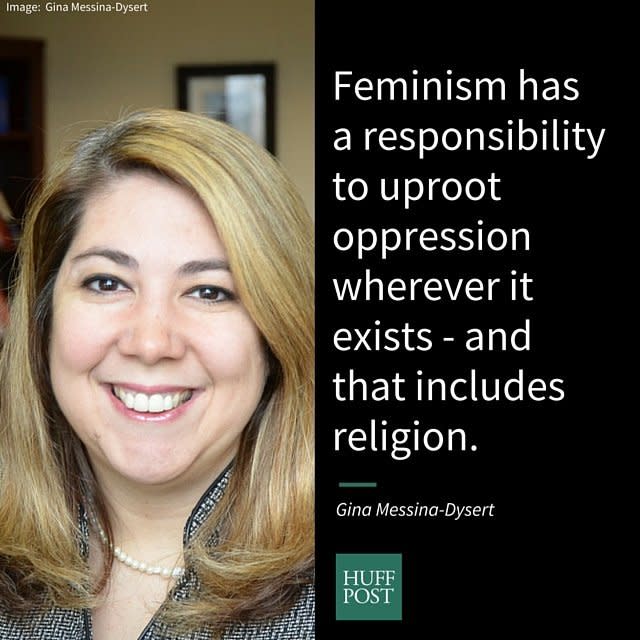
"While many believe the idea of a Christian feminist is an oxymoron, in truth, feminism and Christianity have a long history together. Although, many argue to be feminist is not to be Christian or vice versa, in fact, Christianity has feminist value. If we examine the foundation of the tradition, the idea that every person should be liberated and treated justly, this is very much in line with feminist ideals. Nonetheless, patriarchy has resulted in the manipulation of the tradition into one that has been utilized to oppress women. But with that said, feminism has a responsibility to uproot oppression wherever it exists - and that includes religion. And so, as a feminist lens is used to critique patriarchy in all aspects of society; it is critical that feminists continue to apply the same lens to religious traditions."
This article originally appeared on HuffPost.

